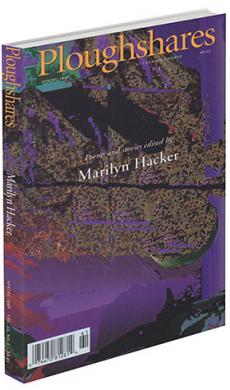rev. of The Chain by Tom Sleigh
The Chain
Poems by Tom Sleigh. Univ. of Chicago Press, $35.00 cloth, $11.95 paper. Reviewed by H. L. Hix.
Tom Sleigh’s third collection,
The Chain, reads as if the history of poetry culminated in his voice. From the beginning, Sleigh’s book encompasses, and is encompassed by, the mythical. “Lamentation on Ur,” an “adaptation, from a French version, of a Babylonian original,” reminds the reader that the ancient need not be
made modern, but always is so already. Subtitled “2,000 b.c.,” the poem mirrors ourselves at 2,000 a.d., and thrives, as every myth must, on music, music, music. “Our country’s dead / melt into the earth,” it tells us, but listen to Sleigh as he sings their dirge: they are “annihilated / / by the double-bladed axe. Heavy, beyond / help, they lie still as a gazelle / exhausted in a trap, / muzzle in the dust.” Such deft alliteration and internal rhyme might make Sleigh seem a light-handed Hopkins or young Yeats, and a match for a maestro like Robert Bringhurst, to whose “The Petelia Tablet” Sleigh’s poem is sister.
But
The Chain embodies more than myth; its ontogeny recapitulates the phylogeny of lyric as well. If Petrarch does not lurk nor Shakespeare speak in “The Work,” that sonnet sequence shows Sleigh has spent time at their knees. Even as his father is “poured out” into “darkness unquenchably long,” Sleigh gives him life, “So that even as he hurtles he keeps holding / / Back like a dam the flood overtops.” His father’s “body’s fevered presence / Shimmers like the phantom heat that will trail / Up the pipe of the crematory oven.” The father becomes, inevitably, both effigy and Ephialtes: the sonnet identified as a dream ends, “Face wholly unwoven, without heart, mind, you / Are nothing in my hands but my hands moving.”
Our more proximate heritage also inhabits these poems. Phrases from the modern masters are hidden in the poems like lockets of a lover’s hair: “loops and whorls” finds its way from Roethke’s greenhouse to the fingerprints of Sleigh’s incarcerated character in “The Tank,” and “fixed stars govern a life” moves from Plath’s “Words” to the “Epilogue” of Sleigh’s “Terminus.” But their voices also resonate in other ways, as in the rhythms of Sleigh’s villanelle “The Explanation,” which, “Sifting like a lover unspoken promises and explanations,” favors all its aunts and uncles: Roethke and Plath, Empson and Thomas, Bishop and Bidart.
All this would be insult, though, an assertion of derivativeness, did not Sleigh’s book infuse the mythical, the lyric, and the modern with the personal. George Oppen was right to observe that “what one must add to the tradition is conviction. One’s own.” Like the subject in his “Crossing the Border,” Sleigh “realizes that the old formulas are useless here” until one arrives at “the limits of the known world.” For Sleigh, “It’s as if the world below demanded / A way of speaking never dreamt of — / / That circles invisibly as radar / Registering the slightest flicker in the soul.” These poems are, as Socrates says beauty always will be, liberated and liberating. To the singer of these poems, his own final words apply: “even as its wings begin to beat, / His soul’s eyes peer into his face.”
H. L. Hix’s most recent book is Spirits Hovering Over the Ashes: Legacies of Postmodern Theory
(SUNY Press, 1995). His first book of poems, Perfect Hell,
recently won the Peregrine Smith Poetry Award and will be published this year by Gibbs Smith.

